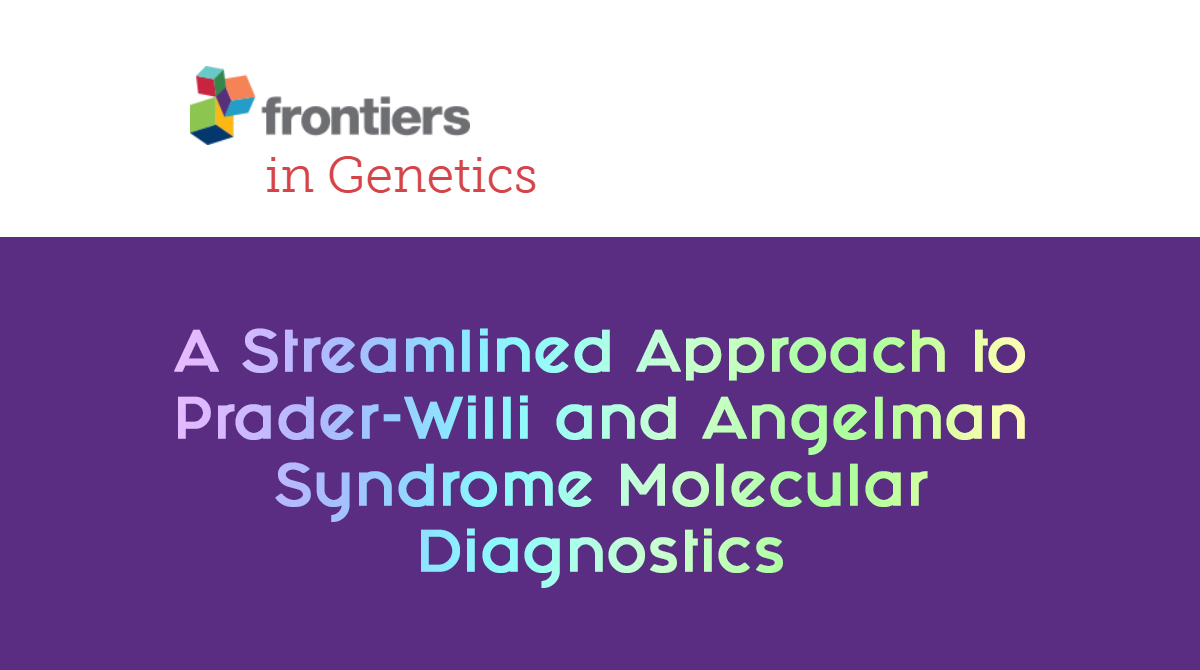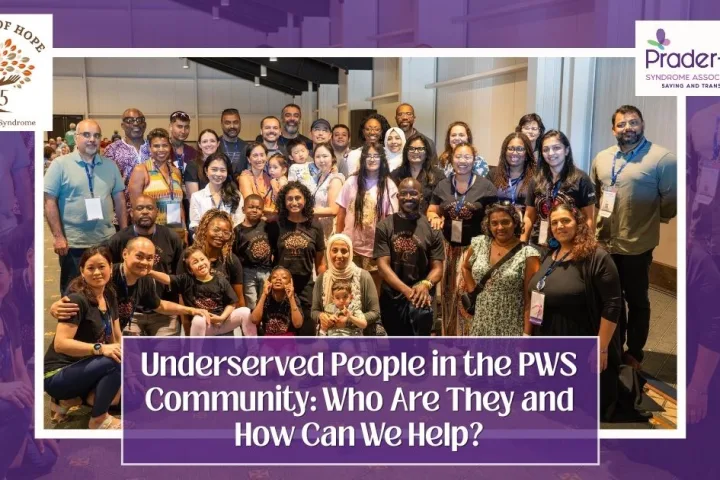Written by: Merlin G. Butler, MD, PhD
Historically, to confirm the diagnosis and molecular genetic classes in Prader Willi syndrome (PWS) required a stepwise approach using multiple methods needing more time and resources. Due to advances in genetic testing and availability of multiple analytical methodologies, a streamlined approach was developed and reported by Strom et al. in 2021. It combines next-generation sequencing (NGS) with the whole exome at the DNA level and methylation-specific multiplex ligation -dependent probe amplification (MS-MLPA) to determine the presence or absence of the PWS methylation signal in a single clinical report or study. The whole exome or NGS method uses three different analytical modules by sequencing the SNRPN gene (involved in Prader-Willi syndrome) and the UBE3A gene (involved in Angelman syndrome, a sister syndrome due to errors in genomic imprinting), copy number or deletion/duplication analysis of chromosome 15 genes within the 15q11-q13 region and absence of heterozygosity (AOH) due to loss of polymorphic DNA markers on chromosome 15. This streamlined approach requires only DNA from saliva or buccal cells from the individual with PWS.
With this single study, the methylation DNA pattern seen in PWS can be found with the use of several methylation specific chromosome 15 DNA probes within the MS-MLPA kit and 99% of individuals with PWS will have an abnormal pattern; 15q11-q13 deletion subtypes in PWS (typical having two types-Type I or Type II or any atypical smaller or larger deletion on chromosome 15) using the MS-MLPA kit and NGS of genes from chromosome 15 seen in about 60% of individuals with PWS; maternal disomy 15 subclasses (heterodisomy, segmental isodisomy or total disomy of chromosome 15) where both 15s come from the mother and may be important for surveillance of other genetic syndromes involving chromosome 15, if the mother is a carrier of a recessive gene defect and the individual with PWS has total isodisomy or segmental isodisomy 15. Maternal disomy 15 is seen in about 35% of individuals with PWS. Imprinting center defects are present in less than 5% of individuals with PWS and of two types (microdeletion, may have a 50% recurrence risk for subsequent children with PWS when the unaffected father has this microdeletion or due to a non-deletion epimutation form). The epimutation of the imprinting center has a low recurrence risk (<2%). The microdeletion form is identified with either or both MS-MLPA or with NGS.
Therefore, this streamlined approach will identify all PWS molecular genetic classes. The DNA signal for both the maternal heterodisomy 15 or epimutation will have identical DNA patterns when studied but little information is known about clinical differences in these two molecular classes and they share the same recurrence risk of <2%. Hence, this new DNA testing approach for PWS utilizes multiple laboratory methods now available in the commercial laboratory in a single setting or report needed for diagnosis, patient care, surveillance and genetic counseling.
Share this!





 Perry A. Zirkel has written more than 1,500 publications on various aspects of school law, with an emphasis on legal issues in special education. He writes a regular column for NAESP’s Principal magazine and NASP’s Communiqué newsletter, and he did so previously for Phi Delta Kappan and Teaching Exceptional Children.
Perry A. Zirkel has written more than 1,500 publications on various aspects of school law, with an emphasis on legal issues in special education. He writes a regular column for NAESP’s Principal magazine and NASP’s Communiqué newsletter, and he did so previously for Phi Delta Kappan and Teaching Exceptional Children. Jennifer Bolander has been serving as a Special Education Specialist for PWSA (USA) since October of 2015. She is a graduate of John Carroll University and lives in Ohio with her husband Brad and daughters Kate (17), and Sophia (13) who was born with PWS.
Jennifer Bolander has been serving as a Special Education Specialist for PWSA (USA) since October of 2015. She is a graduate of John Carroll University and lives in Ohio with her husband Brad and daughters Kate (17), and Sophia (13) who was born with PWS. Dr. Amy McTighe is the PWS Program Manager and Inpatient Teacher at the Center for Prader-Willi Syndrome at the Children’s Institute of Pittsburgh. She graduated from Duquesne University receiving her Bachelor’s and Master’s degree in Education with a focus on elementary education, special education, and language arts.
Dr. Amy McTighe is the PWS Program Manager and Inpatient Teacher at the Center for Prader-Willi Syndrome at the Children’s Institute of Pittsburgh. She graduated from Duquesne University receiving her Bachelor’s and Master’s degree in Education with a focus on elementary education, special education, and language arts. Evan has worked with the Prader-Willi Syndrome Association (USA) since 2007 primarily as a Crisis Intervention and Family Support Counselor. Evans works with parents and schools to foster strong collaborative relationships and appropriate educational environments for students with PWS.
Evan has worked with the Prader-Willi Syndrome Association (USA) since 2007 primarily as a Crisis Intervention and Family Support Counselor. Evans works with parents and schools to foster strong collaborative relationships and appropriate educational environments for students with PWS. Staci Zimmerman works for Prader-Willi Syndrome Association of Colorado as an Individualized Education Program (IEP) consultant. Staci collaborates with the PWS multi-disciplinary clinic at the Children’s Hospital in Denver supporting families and school districts around the United States with their child’s Individual Educational Plan.
Staci Zimmerman works for Prader-Willi Syndrome Association of Colorado as an Individualized Education Program (IEP) consultant. Staci collaborates with the PWS multi-disciplinary clinic at the Children’s Hospital in Denver supporting families and school districts around the United States with their child’s Individual Educational Plan. Founded in 2001, SDLC is a non-profit legal services organization dedicated to protecting and advancing the legal rights of people with disabilities throughout the South. It partners with the Southern Poverty Law Center, Protection and Advocacy (P&A) programs, Legal Services Corporations (LSC) and disability organizations on major, systemic disability rights issues involving the Individuals with Disabilities Education Act (IDEA), Americans with Disabilities Act (ADA), and the federal Medicaid Act. Recently in November 2014, Jim retired.
Founded in 2001, SDLC is a non-profit legal services organization dedicated to protecting and advancing the legal rights of people with disabilities throughout the South. It partners with the Southern Poverty Law Center, Protection and Advocacy (P&A) programs, Legal Services Corporations (LSC) and disability organizations on major, systemic disability rights issues involving the Individuals with Disabilities Education Act (IDEA), Americans with Disabilities Act (ADA), and the federal Medicaid Act. Recently in November 2014, Jim retired.